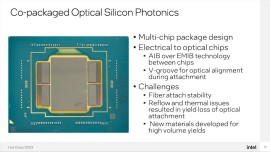
Nel corso della conferenza "Hot Chips", tenutasi di recente presso la Stanford University, un esponente proveniente da Intel ha reso note, o almeno ufficializzato, alcune delle feature che caratterizzeranno i processori a 64-bit Itanium di nuova generazione, tipicamente indicati con il nome in codice di "Poulson", progettati per l'impiego in ambito enterprise (server, workstation, data center, etc...).
Più in dettaglio, i prossimi Itanium "Poulson" supporteranno le tecnologie proprietarie Instruction Replay (è finalizzata alla intercettazione degli errori e alla ripetizione delle istruzioni affette da questi, ndr) e Hyper-Threading (quest'ultima, in particolare, sarà una versione ulteriormente ottimizzata di quella già nota e utilizzata da molti chip Intel, ndr); inoltre, per i "Poulson" Intel ha previsto un nuovo set di istruzioni Itanium.
I processori Itanium di nuova generazione, fabbricati con un processo a 32nm che permetterà l'integrazione di 3.1 miliardi di transistor e 8 core, saranno lanciati nel 2012; in accordo a Intel, a questi seguiranno poi i chip "Kittson" che, al momento, sono ancora in fase di sviluppo.
 |

Intel is using this week’s Hotchips conference to disclose additional new information about its next generation Itanium chip, codenamed Poulson.
The initial Poulson details (8 cores, 3.1 Billion transistor, 32nm process) were disclosed at the International Solid State Circuit Conference earlier this year. While Itanium customers are always interested in coming attractions, it’s also worthwhile for Intel Xeon Server customers to also keep an eye on the evolution of Itanium, as many features originally introduced on Itanium often waterfall down to subsequent generations of Xeon CPU chips. Remember that Poulson, like the current Intel Itanium 9300 processor shares many common platform ingredients with Xeon, including the Intel QuickPath and Scalable Memory Interconnects, the Intel 7500 Scalable Memory Buffer and DDR3, and the Intel 7500 Chipset.
So, what’s new? There are three key feature areas. The first is Intel Instruction Reply Technology, which is a major RAS enhancement. This is the first Intel processor with Instruction Replay RAS capability, and it utilizes a new pipeline architecture to expand error detection in order to capture transient errors in execution. Upon error detection, instructions can then be re-executed from the instruction buffer queue to automatically recover from severe errors to improve resiliency.
The same instruction buffer capability also enables the second new feature, an improved Hyper-Threading Technology. It supports performance enhancement with Dual Domain Multithreading support, which enables independent front and backend pipeline execution to improve multi-thread efficiency. As EPIC architecture is already known for its highly parallel nature, this enhancement will help take Poulson’s overall parallelism to the next level.
Lastly, Poulson is adding new instructions in four key areas. First there are new Integer operations (mpy4, mpyshl4, clz). In support of the higher parallelism and multithreading capabilities, there is expanded Data Access Hints (mov dahr), Expanded Software Prefetch (ifetch.count) and Thread Control (hint@priority). These new instructions lay the foundation for the Itanium architecture to grow with future needs.
As you can see, most of these features are designed to take full advantage of the 8 core, 12-wide issue architecture by enabling the maximum amount of parallel execution. Poulson is on track for 2012 delivery (if you attended HP Discover you may have had a chance to actually see an active Poulson system!) and the follow-on future Kittson processor is under development.
Source: Intel Press Release
Links



